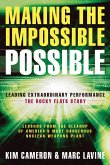In a previous book, John Merrill and Ralph Lowenstein were the first journalism academics in America to predict, correctly, that newspapers and magazines as we know them would soon disappear, to be replaced by digitized products. Drawing on their long experience in journalism and journalism education, they lay out in this book their observations, suggestions and predictions - not only for the American media, but for the education of future journalists. They believe many media moguls have abused their fiduciary responsibility to maintain the financial strength and credibility of the press. They believe few university presidents understand the important relationship between journalism education and political democracy. They describe the chain of neglect that has led to press insolvency, staff unemployment and J-school misdirection. They believe print journalism will be the strongest form of journalism well into the future - although the "print" will not be on paper. It will be on what the authors call an "s-slate," silicon slate, and they believe that every individual from kindergartner to senior citizen will a personal s-slate in the future to retrieve and read books, magazines and newspapers. Merrill and Lowenstein assert that readers of the s-slate will pay for everything they read. The co-authors observe that journalism education's ties to professional journalism are more problematic than at any time in their mutual history, and that there is an unfortunate lack of self-examination about this tragic disconnect in both academe and the mass media. One remedy they suggest is the addition of a half-year to the undergraduate curriculum in which students immerse themselves in an intensive practicum involving print, radio and television. The reward at the end will be a meaningful "certification," in addition to their bachelor's degree. The co-authors also suggest that faculty should serve the media better and teach university administrators better about the true worth of journalism education to the political system.
Bitte wählen Sie Ihr Anliegen aus.
Rechnungen
Retourenschein anfordern
Bestellstatus
Storno








